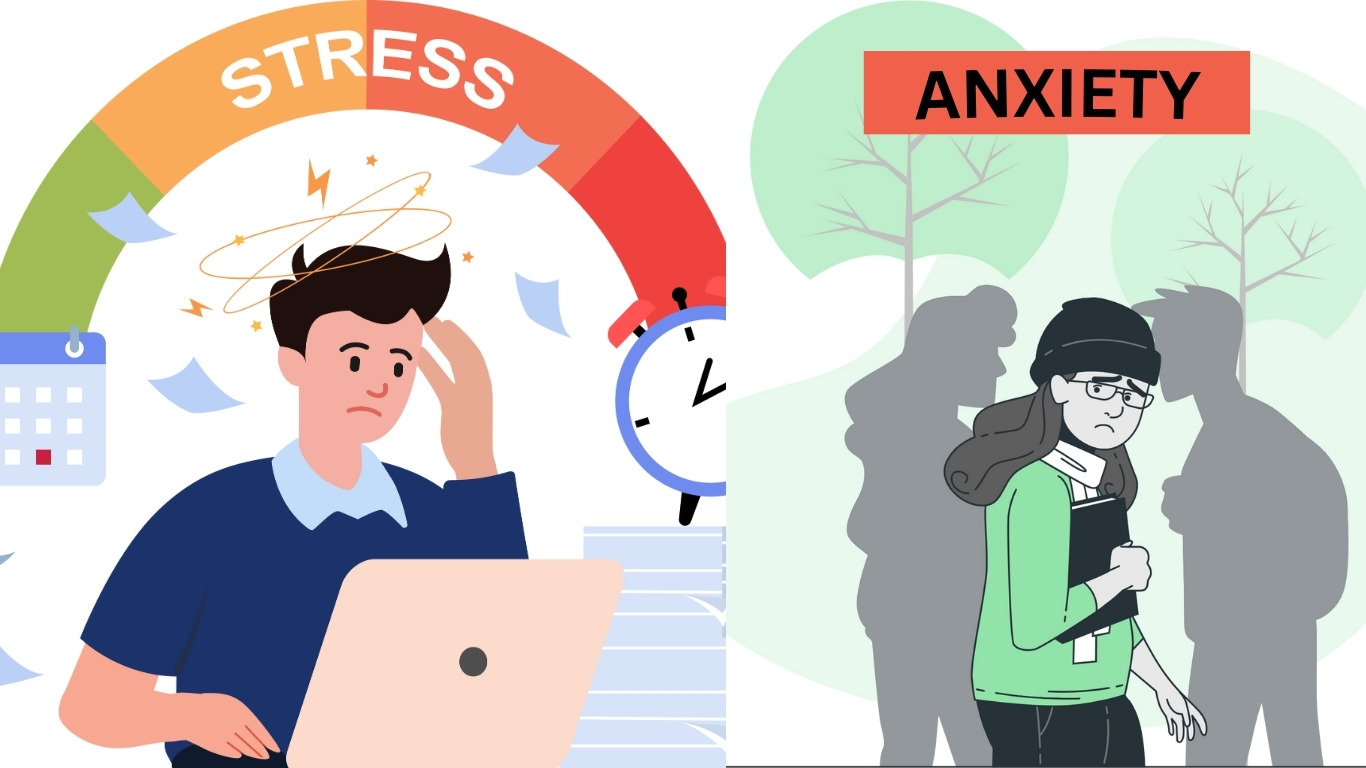Disclosure:
Thank you for reading this post, don't forget to subscribe!
Some of the links on this website are affiliate links. This means that if you click on the link and make a purchase, we may receive a small commission at no extra cost to you. Your support helps us keep the site running.Learn more on my Privacy Policy and Affiliate Disclosure page. Thank you for your support!
In today’s fast-paced world, managing anxiety and stress has become a crucial aspect of maintaining overall well-being. These mental health challenges can affect anyone, regardless of age or background. By understanding anxiety and stress and implementing practical strategies, you can improve your mental health and lead a more balanced life. This comprehensive guide delves deep into effective tips for managing anxiety and stress, helping you navigate life’s challenges with greater ease.
Understanding Anxiety and Stress

Differences Between Anxiety and Stress
While often used interchangeably, anxiety and stress are distinct concepts. Stress is a response to an external cause, such as a tight deadline at work or a disagreement with a friend. It typically resolves once the situation improves. Anxiety, on the other hand, is a persistent feeling of worry or fear that doesn’t go away, even when the stressor is absent. Recognizing the differences between the two can help you address them more effectively.
Read next: Unlocking the Secrets-The Science Behind The Mind-Body Connection.
Common Symptoms
Understanding the symptoms of anxiety and stress is the first step towards managing them. Common symptoms include:
- Physical Symptoms: Headaches, muscle tension, fatigue, stomach issues.
- Emotional Symptoms: Irritability, restlessness, feeling overwhelmed.
- Behavioral Symptoms: Changes in sleep patterns, withdrawal from social activities, difficulty concentrating.
Mindfulness and Meditation

Benefits of Mindfulness and Meditation
Mindfulness and meditation are powerful tools for managing anxiety and stress. These practices encourage you to focus on the present moment, reducing the tendency to dwell on past events or future worries.
Check out: National Institute of Mental Health (NIMH)-Transforming the understanding and treatment of mental illnesses.
Simple Practices to Get Started
- Deep Breathing: Focus on your breath, inhaling slowly through your nose and exhaling through your mouth. Repeat this for a few minutes.
- Guided Meditation: Use apps or online videos to guide you through meditation sessions.
- Mindful Observation: Spend a few minutes each day observing something in your environment without judgment, such as the movement of trees in the wind.
Physical Activity
Lorem ipsum dolor sit amet, consectetur adipiscing elit. Ut elit tellus, luctus nec ullamcorper mattis, pulvinar dapibus leo.

How Exercise Can Reduce Anxiety and Stress
Regular physical activity boosts the production of endorphins, the body’s natural mood lifters. Exercise also improves sleep, increases self-confidence, and reduces the symptoms of anxiety and stress.
Recommended Activities
- Cardio Workouts: Running, swimming, or cycling.
- Strength Training: Lifting weights or bodyweight exercises.
- Mind-Body Exercises: Yoga and Tai Chi, which combine physical movement with mindfulness.
learn more about: Sleep Your Way To A Healthier You-The Power Of A Good Night’s Rest.
Healthy Eating

The Connection Between Diet and Mental Health
Your diet plays a significant role in your mental health. Nutrient-rich foods can improve brain function and stabilize mood, while processed foods and sugars can increase anxiety and stress.
Foods That Help Reduce Anxiety and Stress
- Fatty Fish: Rich in omega-3 fatty acids, which support brain health.
- Leafy Greens: High in magnesium, known to reduce anxiety.
- Berries: Packed with antioxidants that protect the brain.
- Whole Grains: Help maintain stable blood sugar levels, reducing mood swings.
Quality Sleep
Importance of Sleep for Mental Health
Quality sleep is essential for emotional regulation and cognitive function. Lack of sleep can exacerbate anxiety and stress, creating a vicious cycle.
Tips for Better Sleep
- Establish a Routine: Go to bed and wake up at the same time each day.
- Create a Relaxing Environment: Keep your bedroom dark, quiet, and cool.
- Limit Screen Time: Avoid screens at least an hour before bedtime.
Effective Time Management
Strategies for Managing Time to Reduce Stress
Effective time management can significantly reduce stress. Prioritizing tasks and setting realistic goals helps create a sense of control and accomplishment.
Practical Tips
- Make a To-Do List: Break down tasks into manageable steps.
- Prioritize Tasks: Focus on high-priority tasks first.
- Take Breaks: Schedule regular breaks to avoid burnout.
Further Reading: Natural Remedies for Better Sleep-Natural Ways to Get Better Sleep.
Building a Support Network

Importance of Social Support
Having a strong support network is crucial for managing anxiety and stress. Friends, family, and colleagues can provide emotional support, practical help, and a sense of belonging.
Ways to Strengthen Your Support Network
- Stay Connected: Regularly communicate with loved ones.
- Join Groups: Participate in community activities or support groups.
- Seek Professional Help: Don’t hesitate to reach out to a therapist or counselor if needed.
Therapy and Counseling
Benefits of Professional Help
Therapy and counseling provide a safe space to explore your feelings and develop coping strategies. Professionals can offer personalized advice and support tailored to your specific needs.
How to Find a Therapist
- Ask for Recommendations: From friends, family, or your primary care doctor.
- Use Online Directories: Websites like Psychology Today offer searchable databases of therapists.
- Consider Teletherapy: Virtual sessions can be convenient and accessible.
Relaxation Techniques
Techniques for Reducing Anxiety and Stress
Relaxation techniques help calm the mind and reduce the physical symptoms of anxiety and stress.
Effective Methods
- Deep Breathing: Practice diaphragmatic breathing to calm the nervous system.
- Progressive Muscle Relaxation: Tense and then slowly release each muscle group.
- Visualization: Imagine a peaceful scene or experience to relax your mind.
explore more from morningscape mindset media:
- Gut Health Decoded: How Your Microbiome Shapes Energy, Mood, and Immunity
- The Science of Stillness: How Doing Nothing Can Heal Your Mind and Body
- Are You a Late-Night Snacker? 5 Possible Reasons Why You Can’t Stop Craving Food at Night
- The Ultimate Fat-Loss + Muscle Retention Blueprint (For Men)
- Smart Biceps Training: A Science-Backed Blueprint for Bigger, Stronger Arms
Setting Boundaries

Importance of Setting Boundaries
Setting boundaries is essential for protecting your mental health. It involves knowing your limits and communicating them to others.
How to Set and Maintain Boundaries
- Be Assertive: Clearly communicate your needs and limits.
- Learn to Say No: It’s okay to decline requests that overwhelm you.
- Take Time for Yourself: Ensure you have personal time to recharge.
Conclusion
Managing anxiety and stress is a continuous journey that requires patience and practice. By incorporating these practical tips into your daily routine, you can improve your mental health and lead a more balanced, fulfilling life. Remember, seeking help is a sign of strength, and building a support network is crucial for long-term well-being.
Take Charge of Your Mental Health Today!
Share this article with friends and family to spread awareness about the importance of managing anxiety and stress. Together, we can build a supportive community focused on mental well-being.
Follow us on social media for more tips, motivation, and community support:
more about:
HEALTH / WELLNESS / FITNESS / NUTRITIO








